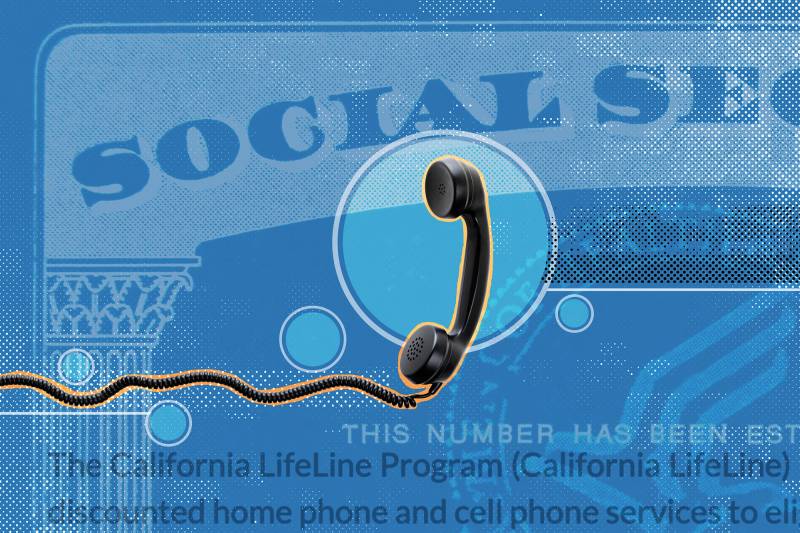She has since switched to a $25-a-month plan and uses an old phone with a dying battery.
“I use it a lot,” she said, “to connect with my attorney and people from (Neighborhood Legal Services), my church, with my son.”
Ruvalcava, who is undocumented, said she would sign up for LifeLine and lose the monthly bills if she could. “Twenty-five dollars saved a month is really helpful to buy things for my son.”
The state’s LifeLine program reimburses phone and internet service providers $19 a month per low-income customer they sign up for free or low-cost cell or internet service.
To qualify, a customer must earn less than 150% of the federal poverty line, which is about $45,900 a year for a four-person household. Most recipients of other social services, such as CalFresh or Medi-Cal, would qualify for LifeLine.
Many also usually qualify for the federal Lifeline program, but that program requires recipients to have Social Security numbers and reimburses providers $9.25 a month per customer.
Advocates said at least 700,000 undocumented Californians would benefit from removing the Social Security requirement from the LifeLine application. They based the estimate on how many undocumented Californians became eligible for Medi-Cal through recent expansions of those services.
The Social Security barrier
Over the years, California has expanded its welfare programs to undocumented residents, including CalFresh and Medi-Cal.
Even the federal government allows undocumented immigrants to qualify for its pandemic-era Affordable Connectivity Program, which subsidizes broadband access for low-income residents. That program doesn’t require a Social Security number.
In 2014, the state’s Public Utilities Commission directed staff to begin the process of expanding LifeLine to consumers lacking Social Security numbers. The following year, the commission requested a waiver from federal regulators to allow those people to apply to the federal program. So far, there has been no waiver.
The California Public Utilities Commission said it has stopped using Social Security numbers as a “gating factor” in determining the identity of an applicant. The agency didn’t say when it made that change.
Last year, multiple “stakeholders” informed the agency that just having the option to enter a Social Security number on LifeLine applications was a barrier for some applicants, said Terrie Prosper, a spokesperson for the commission. That’s when the agency started asking for feedback.
“The California LifeLine program is constantly evolving,” Prosper said. “Moreover, the program must adapt to evolving technology and a dynamic market while simultaneously balancing the needs of low-income qualified consumers and the challenges of managing multiple wireless service providers who participate voluntarily.”
Advocates say they were not aware of any changes the utilities commission made to their application process, and regardless of the changes, residents without legal status haven’t been able to access the program.
“It’s not making a meaningful difference for folks to be able to access the program,” Salas said.
The impact of years of delay
Julie Rattray, an attorney for Neighborhood Legal Services of Los Angeles County, said she discovered the state’s 10-year delay last year when a client who already had Medi-Cal tried signing up for LifeLine. The client was turned down.
Rattray said a staff person in the commission’s communications division told her the 2014 decision had not been implemented.
“We never imagined that one year later … the CPUC would still have failed to take action, but here we are,” she said.
Rattray said California’s LifeLine has fallen behind the trend of other state programs.
“If people are missing their medical appointments, if they miss their benefit renewals, if they can’t make an appointment with social service providers, you’re going to see significant impacts on households and their health,” she said.
That has already happened. A study last year found inadequate cell phone devices or service were major deterrents for elderly, non-English speaking patients seeking telehealth care during the pandemic, said Arturo Vargas Bustamante, professor at the UCLA Fielding School of Public Health.
The Public Utilities Commission said cost isn’t an issue. A monthly surcharge on existing telephone service funds the state LifeLine program. The program’s budget for fiscal year 2022–23 was $274.4 million, according to the agency.
Many undocumented immigrants already are paying into the program via the surcharge, though many can’t benefit from it, said Vinhcent Le, technology equity legal counsel for the Greenlining Institute, which promotes equity for communities of color.
Seeking ‘safe harbor’
The California utilities commission in December asked providers and advocates some questions about the proposed change: Instead of Social Security numbers, what other forms of identity verification should the state use? And should California subsidize the federal discounts Californians won’t receive because they lack Social Security numbers?
AT&T wrote in its response that it doesn’t have a position on what the commission should substitute for Social Security numbers, but the state should make up for losing federal support for LifeLine participants if the change moves forward.
TracFone Wireless, a Verizon subsidiary, said the changes would impose a burden because supplemental ID documents would have to be manually reviewed. The company also suggested the state commission should create a “safe harbor” provision to protect providers from claims and administrative penalties for accepting LifeLine participants without Social Security numbers.
“Without such a safe harbor, TracFone believes that many providers will be reluctant to develop enrollment system changes and marketing that permit the no SSN enrollment exception,” the company wrote.
Several phone service providers said that without Social Security numbers, verifying identities to avoid fraud or duplicate accounts would be more difficult.
Sala said such concerns are an excuse to create barriers for low-income customers.
